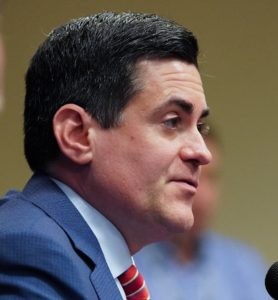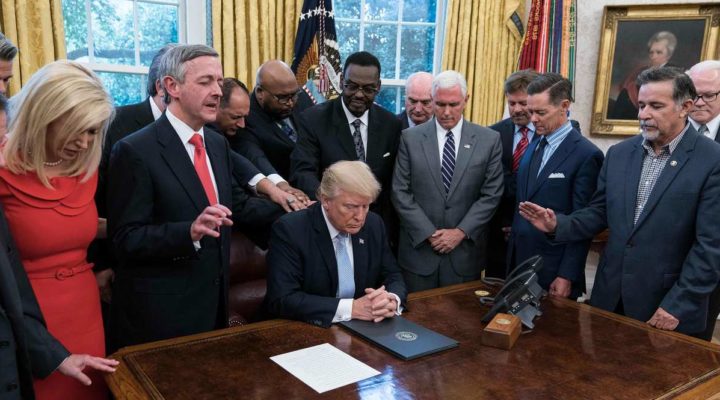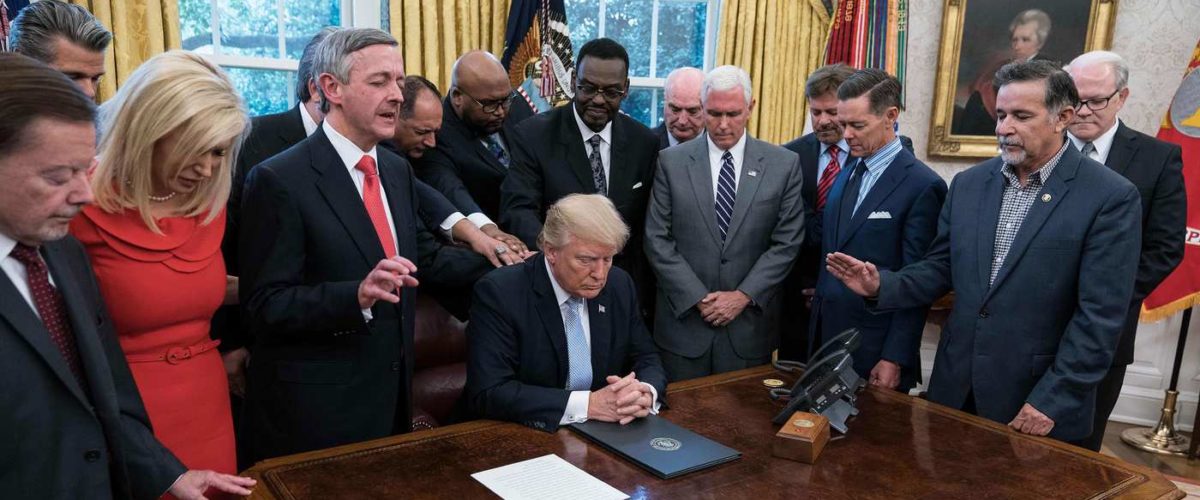From the Department of What’s Old is New Again: The Southern Baptist Convention’s ethics agency is being accused of liberalism and creating a distraction from the work of evangelism and missions.
During the fundamentalist takeover of the SBC that began in 1979 and culminated in 2000, one of the first and most frequent targets of attack was the SBC Christian Life Commission, precursor to today’s Ethics and Religious Liberty Commission. Forty years later, the accusations sound much the same.
What’s different from 1979 to 2021 is four things: Donald Trump, Black Lives Matter, QAnon and the need to find some easy explanation for the continued decline in giving to the SBC’s unified budget, the Cooperative Program.
A study motivated by declines in giving
That last factor is the hinge on which the report of a special inquiry task force relies. The study group was appointed in February 2020 and tasked with assessing whether the ERLC’s activities and leadership are “affecting Cooperative Program giving.”

Russell Moore
Notably, the seven-member group was not tasked to evaluate the biblical or ethical positions being taken by the ERLC nor to gauge whether those positions represent the majority view of Southern Baptists. The criteria for study was monetary.
The resulting report, which is dated Jan. 16 but was not released publicly until Feb. 1, outlines a reality about the SBC’s finances that is otherwise hard to detect in happier denominational reporting: Giving to the SBC is in “steady decline” — echoing the trend of all denominational groups in America.
The study group notes it would be understandable if Southern Baptists have missed this reality because of the way Baptist Press, the SBC’s own news service, reports about giving. The positive trend is that the percentage of total undesignated receipts forwarded to the national convention from state Baptist conventions has increased, meaning the SBC is getting a larger piece of the state convention pie. However, the negative trend is that churches are sending less money to the state conventions, meaning those pies are smaller. Bottom line: Getting a larger slice of a smaller pie means less pie.
The report explains: “Percentage giving by churches has fallen by more than half over the last three decades. This is despite the fact that total giving to SBC churches has grown from around $4 billion to around $12 billion in this same time frame.”
“Percentage giving by churches has fallen by more than half over the last three decades.”
That means churches are taking in more money but sending less to the denomination through their state conventions, which in turn are sending a greater percentage of gifts but actually less money to the SBC.
Although the SBC prides itself on being non-connectional in governance, the reality is that the Cooperative Program is built on a pass-through model that goes from offering plate to church to state convention to national convention and then to the agencies of the national convention. (Hold that thought, though, because this factors into another concern expressed about the ERLC.)
This decline in Cooperative Program giving “began many years prior to the current leadership of the ERLC,” the report acknowledges. “The task force knew from its inception that the long-term downward trend in Cooperative Program giving could not be solely attributed to concerns over the current direction of the ERLC.”
And yet, the report goes on to predict that if the ERLC doesn’t change its ways, the decline in giving will only accelerate.
Examples of reduced giving due to ERLC positions
This prediction is based on interviews with the executive directors of 15 state Baptist conventions — some of whom report churches in their states already have reduced or withheld giving in protest of the ERLC or are threatening to do so. The report gives two pages of examples from state convention leaders.
Among those examples:
- One state said more than 250 churches are “considering withholding or negatively designating funds.” It added: “Some churches are considering a complete withdrawal from the SBC because of the belief that the national convention is moving in a liberal direction. The ERLC is listed as one of those concerns.” The potential loss is estimated at nearly $2.5 million.
- Another state “verified that $1,147,000 has been withheld due to the ERLC.”
- Another state “reported that 94 churches have either decreased or completely eliminated Cooperative Program support this year at a total budget cost of approximately $500,000.”
- One state leader said 46 churches have withdrawn from the convention due to concerns over the ERLC, creating a $217,000 annual loss in giving.
- Yet another state leader “confirmed a $345,000 annual impact from churches currently withholding or considering escrowing Cooperative Program funds. This is because of “a perceived leftward or liberal drift generally.”
- Another state executive reported the loss of five to 10 churches with another 30 to 40 on the line. Despite those losses attributed to the ERLC, this state leader cited “a good deal of affirmation in the state for the work of the ERLC, particularly among the younger pastors.”
That last finding lines up with other national research showing that younger evangelicals hold more open views on key ethics and religious liberty issues such as immigration and racial justice.
What are the concerns?
Outside observers might wonder how the ERLC — which like the SBC itself has taken a sharp rightward turn since the old days of SBC schism — could be accused of liberalism. The answer is that “liberalism” is defined in the eye of the beholder.
Outside observers might wonder how the ERLC — which like the SBC itself has taken a sharp rightward turn since the old days of SBC schism — could be accused of liberalism.
Forty years ago, the old Christian Life Commission became a target because it would not take an aggressive role in the fight against abortion. It also was criticized for its traditional perspective on religious liberty and allowance that people of all faiths and no faith deserved equal rights. The CLC also declined to become a warrior in what was then coming to be known as America’s “culture wars” between evangelicals and secularism.
The modern-day ERLC has earned undisputed bona fides as an opponent of abortion, and it is known as anti-inclusion on LGBTQ rights. However, for some SBC conservatives, that’s not enough.
The agency’s head, Russell Moore, has been a regular and straightforward critic of the Trump administration for its lack of morality, compassion and Christian character. He and the agency have continued to speak on behalf of welcoming immigrants and refugees as a biblical imperative. And the ERLC has sought to work with other agencies and ministries where it finds common ground on key issues.
The report lists 10 areas of concern about the ERLC’s work, topped by “the open opposition of a candidate for president of the United States.”
Other concerns cited include the agency’s position on immigration, silence on the perceived persecution of California churches forced to close due to public health orders related to the pandemic, criticizing “conservative political figures” more often and more harshly than “moderate to liberal figures,” and Moore’s “stated support of attending homosexual wedding showers and receptions.”
Second on the 10-point list, however, is this: “The accusation of receiving funding from an organization with ties to George Soros.”
Second on the 10-point list, however, is this: “The accusation of receiving funding from an organization with ties to George Soros.”
This is a previously debunked conspiracy theory likely originating out of the QAnon movement that claimed the ERLC was part of an immigrant advocacy group funded by Soros, a favorite boogeyman of the far right and conspiracy theorists. Baptist Press explained a year ago why this isn’t true, and yet it ended up as the second bullet point of the study group’s list of accusations.
That’s just one reason the SBC Executive Committee ought to reject this special report out of hand, wrote Adam Blosser on the website SBC Voices. Blosser is pastor of Goshen Baptist Church in Spotsylvania, Pa.
“The problem I have with this list of grievances is that they are listed ‘without commentary.,’ he wrote. “Giving the task force the benefit of the doubt, I’ll assume that in their minds they thought this would make them appear more neutral. Instead, their failure to address each concern leaves Southern Baptists who read this report wondering whether there is any validity to these concerns.
“Is the ERLC really receiving funding from George Soros? Of course not! Baptist Press has already addressed that lie back in January 2020 (before this task force was even created). But instead of addressing each concern and seeking either to set the record straight or amplify the concern, the task force report actually references one of the tabloid rags that is responsible for spreading the lie in the first place.”
Additional concerns
Although not listed on the 10-point summary, the report cites other significant concerns expressed by state convention executives about the ERLC, its work and leadership.
One of those is the fact that Moore denounced the deadly Jan. 6 riot at the U.S. Capitol — led by Trump loyalists seeking to overturn the results of the 2020 presidential election and potentially execute the vice president and members of Congress — but did not similarly condemn “the violent and destructive protests that swept the entire nation for months beginning in the summer of 2020” — a reference to the largely peaceful Black Lives Matter and related social movements sparked by police killings of Black citizens.
Another is the SBC Executive Committee’s own beef with the ERLC over an amicus brief the ERLC filed with the U.S Supreme Court in a case related to the SBC North American Mission Board. That brief was filed in August 2020 and relates to charges by Will McRaney, former executive director of the Baptist Convention of Maryland/Delaware.
McRaney alleges that NAMB intentionally defamed him and wrongfully influenced his 2015 termination by the Baptist Convention of Maryland/Delaware after a dispute over collaborative missions efforts in the region.
The Executive Committee’s concern was that the ERLC brief described the SBC as a “hierarchy” that serves as an “umbrella Southern Baptist governing body over all of the various groups of churches.”
The ERLC later amended that description, under intense pressure from other SBC entities and leaders.
In the eyes of some critics of the ever-powerful Executive Committee, the very investigation of the ERLC makes the point of an SBC hierarchy.
Yet in the eyes of some critics of the ever-powerful Executive Committee, the very investigation of the ERLC makes the point of an SBC hierarchy.
That is noted in a February 2020 blog written by Jay Adkins on the website SBC Voices. He called the SBC Executive Committee’s investigation “a dangerous overreach.”
Adkins, pastor of First Baptist Church Westwego in metro New Orleans, saw in the special inquiry a danger others had warned about when from 1997 to 2003 the Executive Committee asked all SBC agencies to make the Executive Committee the “sole member” of their corporations, meaning the Executive Committee would have ultimate legal control over all the agencies and institutions.
The study group’s report devotes 13 paragraphs to a defense of the Executive Committee’s right to examine the ERLC.
“It would be difficult to envision an Executive Committee task more squarely within the scope of its convention-assigned duties than the study of whether the actions of an entity are hindering the fiscal well-being of the convention, particularly when the concerns have been raised by a fellowship of duly-elected chief executive officers of our various state conventions,” the report explains.
And, without irony, the study report concludes with a request that ERLC and other SBC entities grant the Executive Committee even more oversight over their work by “submitting legal briefs, where those briefs address the nature and work of Southern Baptists, to convention attorneys, prior to their being filed, for the purpose of receiving input regarding the effect of those briefs on the ministries of the Southern Baptist Convention.”
Findings and recommendations
The special inquiry concludes with five findings and six recommendations. The three most salient findings are these:
- “That while much of the work of the ERLC is praised and appreciated by Southern Baptists, the ERLC is also a source of significant distraction from the Great Commission work of Southern Baptists. The leader of a large state convention reported, ‘The ERLC has been a stumbling block not worth the mission dollar investment.’ The task force finds merit in this statement.”
- “That the current perception of the leadership and direction of the ERLC by many Southern Baptists is a substantial impediment to the growth of the Cooperative Program. Without quick and significant changes in that perception, the findings suggest the potential for a measurable decline in the near future and beyond.”
- “That there is considerable conversation across the convention as to whether the ERLC is the most effective and efficient structure and means for addressing the public policy concerns of the Southern Baptist Convention.”
Those sound eerily like the criticisms leveled against the Christian Life Commission 40 years ago. What’s old is new again.
Or to quote the noted professor of religion Randall Balmer: “The Southern Baptist Convention has apparently gone liberal and is in need of another conservative resurgence. Who knew?”


